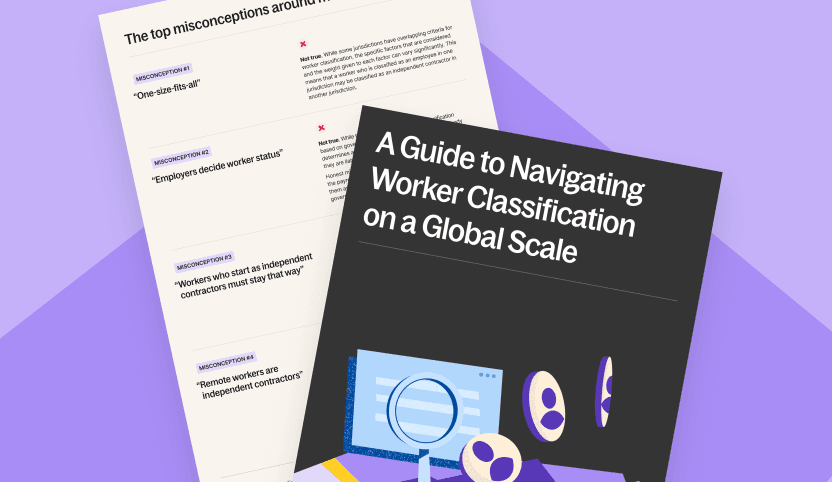Template
Employment Contract in the US - Free Template
Legal & compliance

Get the resource for free
In the United States, there are two types of employment contracts: at-will contracts and term contracts.
What is an employment contract
An employment contract, also referred to as an employment agreement or job contract, is a legally binding document that establishes the terms of the employment relationship between an employer and their employee.
What’s the purpose of an employment contract?
An employment contract clearly defines the terms and conditions of employment between employee and employer by establishing the responsibilities and obligations of the working relationship. By using this type of contract, employers can improve the employee experience and mitigate legal risks.
- Provide new employees with a clear understanding of their position and job responsibilities
- Offer stronger job security to employees by protecting their employment status with a legally binding contract
- Streamline dispute resolution by using the agreement as a source of truth to resolve workplace issues and avoid the rise in workplace arbitration cases. For example, if there’s a dispute over the amount of paid time off an employee is entitled to, either party can refer to the agreement for clarification
- Protect the company’s confidential information, rights to contract termination, and more
Elements of an employment contract
Under American law, there are few required conditions for an employment contract. Most employment relationships are at-will, meaning the employment relationship can be terminated at any time. However, it's still important to draft a clear and legally binding agreement signed by both parties and to follow federal, state, and local labor laws.
A typical employment contract in the U.S. should include:
- Employee’s name
- Employee's contact information
- Job title and description, including specific duties
- Start date/end date (if applicable)
- Salary or wages and payment schedule
- Benefits package details (including health insurance, retirement plans, etc.)
- Vacation and sick leave entitlements
- Conditions for termination and notice requirements
- Confidentiality and non-compete clauses (as applicable)
What are international employment laws?
International employment laws, or labor laws, govern the terms of employment between an employer and employees residing in different countries. Local governments implement them to protect fundamental employee rights, promote job security, and improve employment terms globally.
The primary employment laws present throughout the world govern the following:
- Minimum wage
- Overtime pay
- Hours of work
- Rest breaks
- Employment contracts
- Benefit entitlements such as vacation time, sick leave, parental leave, and pension plan
- Probationary periods
- Notice periods
- Background checks
- Payment methods
- Payment periods
- Payment frequency
- Payroll taxes
- Payroll records
- Termination
- Severance pay (if applicable)
Download a free employment contract template for the USA
Download our free employment contract template, covering essential elements like job duties, compensation, benefits, termination clauses, and confidentiality agreements and simplify your hiring process. Crafted by Deel’s legal experts, this template will streamline your HR tasks and safeguard your business.
Disclaimer: The content in this document is provided for general information purposes only and does not constitute legal advice. Consult with legal counsel and check compliance with local labor laws before sharing the agreement with your employee.






